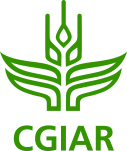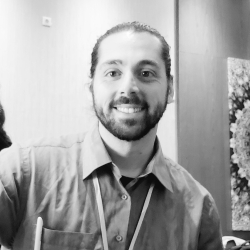First Step on a Four Years Route to Strengthen Knowledge Management for Greater Development Effectiveness
Published on: October 30, 2018, Submitted by Valerio Graziano on: October 27, 2018
The key to institutional competence transferral is providing practical examples of effective best practices applications.
Strengthening Knowledge Management for Greater Development Effectiveness: Inception Workshop day 1 and 2. Group photo.
The International Center for Agricultural Research in Dry Areas (ICARDA) and the International Fund for Agricultural Development (IFAD) build on their experience of Research for Development (R4D) projects in the Near East, North Africa and Central Asia and bring now together more than 15 national and international partners from Moldova, Morocco and Sudan to scale up and develop effective and long-term knowledge management (KM) capacities. This new initiative, called "Strengthen Knowledge Management for Greater Development Effectiveness", will take the participating institutions on a 48 months discovery route, engaging in practical trainings and exercises of best practices in KM, which will be used as basis to develop sound KM strategies.
The first step has already been taken with the inception workshop, held 9th-10th of October 2018 in Rabat, Morocco, organized by ICARDA in collaboration with CIHEAM-Bari, Procasur, Virginia Tech and funded by IFAD. In this occasion, all partners have shared their will in committing to develop capacities able to take on the challenge of KM in their home institutions and countries.
The workshop objectives were to:
- Present the donor, the project and related objectives.
- Get to know all partners and their experience of KM.
- Analyse the partners' KM assets through a preliminar Capacity Need Assessment (CNA).
- Present a prospect of the activities that will engage the partners for the duration of the project.
- Establish a clear vision of progress in terms of KM among all partners.
The warm welcome of Dr. Michael Baum (ICARDA BIC Program and Morocco Platform Director) has been followed by the opening remarks of Lead Regional Economist Mr. Abdelkarim Sma defining IFAD perspective on the project and knowledge management, later detailed in terms of approach by Ms. Mia Madsen (IFAD Associate Program Officer):
IFAD defines knowledge management as a set of processes, tools and behaviours that connect and motivate people to generate, use and share good practice, learning and expertise to improve IFAD's efficiency, credibility and development effectiveness.
The ICARDA Project Manager Dr. Akmal Akramkhanov proceeded with the overview of the project and its three intended outcomes:
- Improving understanding of KM capacities of institutions.
- Establishing effective learning systems within key partners institutions, ensuring the sustainability, replication and the scaling over time of KM practices.
- Improving knowledge exchange among stakeholders.
Eache of these outcomes is to be reached during the project implementation by following adequate strategies, which were presented immediately after. Dr. Akramkhanov went through the knowledge sharing strategy, Mr. Enrico Bonaiuti (ICARDA M&E Specialist) detailed the monitoring and evaluation key aspects and Mr. Bastian Mueller (ICARDA E-Learning and Training Officer) explained the Capacity Need Assessment (CNA) approach.
Following the introductory presentations, all participants introduced their representing institutions and their starting objectives in terms of KM, sharing their current experience with it. They were then engaged in a brainstorming excercise on institutional KM, the first of the two-parts preliminary CNA conducted by Mr. Mueller.
The second day completed the preliminary CNA. This time the participants were sorted by stakeholder, creating four groups: National Agricultural Research Systems (NARS), Academic Institutions, Governmental Institutions and Advanced Research Institutions. Consolidating the experience-sharing exercises of the first day, the second session has been focused on a series of excercises to assess the partners awereness of their needs and gaps in terms of capacity development (CapDev).
The preliminary CNA had the participants circulate their wealth of knowledge on KM and CapDev, a richness of experience coming from different case scenarios of related institutions and countries, providing already valuable lessons due to the interdisciplinarity of the participants. The partners have underlined the need to:
- Improve institutional efficiency through knowledge management.
- Develop integrated and innovative thinking.
- Improve capacity building.
- Improve the communication of results.
- Adopt a clear monitoring and evaluation framework.
Further discussions on the CNA were concerned with advocacy and lobbying strategies capable of bringing about desired changes and influencing key stakeholders and policy makers, as well as increasing investments in both KM and CapDev areas. The need to align the research agenda with current partners priorities in terms of network building was also highlighted.
Knowledge Management today is commonly carried out as storing or sharing information products a various sort. It can mean collecting and make available journal articles, datasets, reports and conference materials, but also blogs, websites and more. KM often overlaps with Knowledge Sharing and each organization has its own way to draw the line between the two, while for some others KM just includes KS overall. What is surely lacking on a global scale is a common understanding of what Knowledge Management means in terms of tasks and workflow. In this sense, the project SKM in NENACAE offers an opportunity for partners to develop institutional awareness of KM needs and the capacity to meet them.
Acknowledgement
The aims of this project are being achieved thanks to the synergic efforts of International Center for Agricultural Research in the Dry Areas (ICARDA), CIHEAM-Bari, Procasur, Virginia Tech, all national and international partners and are funded by the International Fund for Agricultural Development (IFAD). The Monitoring, Evaluation & Learning (MEL) platform supporting the project is also powered by CodeObia and Amazon Web Services (AWS).
Moldova
- Ministry of Agriculture, Regional Development and Environment (MADRM)
- Consolidated Programme Implementaton Unit (CPIU-IFAD)
- Research Institute of Field Crops "Selectia"
- State Agrarian University (SAUM)
- Institute for Development and Social Initiatives "Viitorul"
Morocco
- National Agricultural Research Institute (INRA)
- IFAD Country Program
- Natonal Office for Agricultural Extension (ONCA)
- Agronomic and Veterinary Institute (IAV Hassan II)
- National School of Agriculture (ENA-Meknes)
Sudan
- Agriculture Research Corporation (ARC)
- Central Coordination Unit for IFAD
- Sudanese Knowledge Society
- Knowledge Access in Rural Interconnected Areas Network (KariaNet)
- University of Khartoum (UofK)






